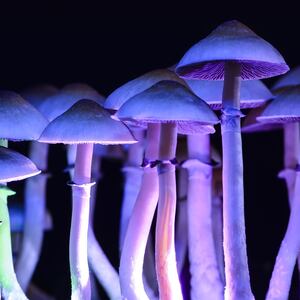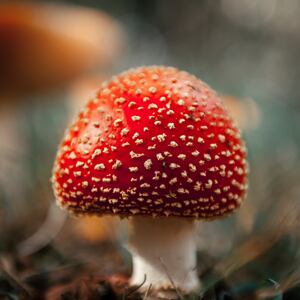While “magic mushrooms” are a mainstay of Burning Man and Grateful Dead concerts, they’re also attracting the attention of scientists. That’s because there’s evidence to suggest that psilocybin, the main compound of the drug that causes psychedelic trips, could hold the key to treating mental-health issues such as treatment-resistant depression.
A team of researchers at Imperial College London’s Centre for Psychedelic Research published a paper in the journal Nature Medicine on Monday concerning a study where patients with depression were given a synthesized form of psilocybin. The treatment resulted in increased neuroplasticity, or the way neurons establish new connections in the brain. This process can help fight depression as it can help keep your brain from creating cycling, negative thoughts. The patients who took the psychedelic also had increased self-reported improvements in their mental health.
Interestingly, the study also seemed to suggest that the psilocybin compound resulted in more brain connectivity than with patients who received only escitalopram, a selective-serotonin reuptake inhibitor (SSRI) sold under the name Lexapro. This marks a big step forward for psilocybin as a viable alternative to help tackle treatment-resistant depression.
“These findings are important because for the first time we find that psilocybin works differently from conventional antidepressants—making the brain more flexible and fluid, and less entrenched in the negative thinking patterns associated with depression,” David Nutt, head of Imperial and co-author of the study, said in a press release.
He added that the study “confirms psilocybin could be a real alternative approach to depression treatments.”
The paper builds off of previous research from Imperial, and analyzed MRI scans from nearly 60 patients with treatment-resistant depression. One group of participants received the psilocybin compound and an SSRI control, while another received the SSRI with a psilocybin control. All patients took part in regular talking therapy with mental-health professionals. However, they found that patients who took the psychedelic saw the most improvements over the course of the study.
Before you run out and start gobbling up magic mushrooms to treat your depression, though, remember that the experiments occurred in a very controlled, clinical environment. The team is quick to add that the psilocybin doses were also created in a laboratory, and medical professionals were on hand to make sure everything went safely for the patients.
We’re still a long way from a commercially viable psilocybin treatment for depression. However, the team’s findings are just more evidence to the psychedelic’s efficacy for treating mental-health maladies. The study’s authors now hope that it’ll open the doors to using the trippy drug to tackle a host of other medical needs.
“One exciting implication of our findings is that we have discovered a fundamental mechanism via which psychedelic therapy works not just for depression—but other mental illnesses, such as anorexia or addiction,” Robin Carhart-Harris, former head of Imperial and lead author of the study, said in the release. “We now need to test if this is the case, and if it is, then we have found something important.”







